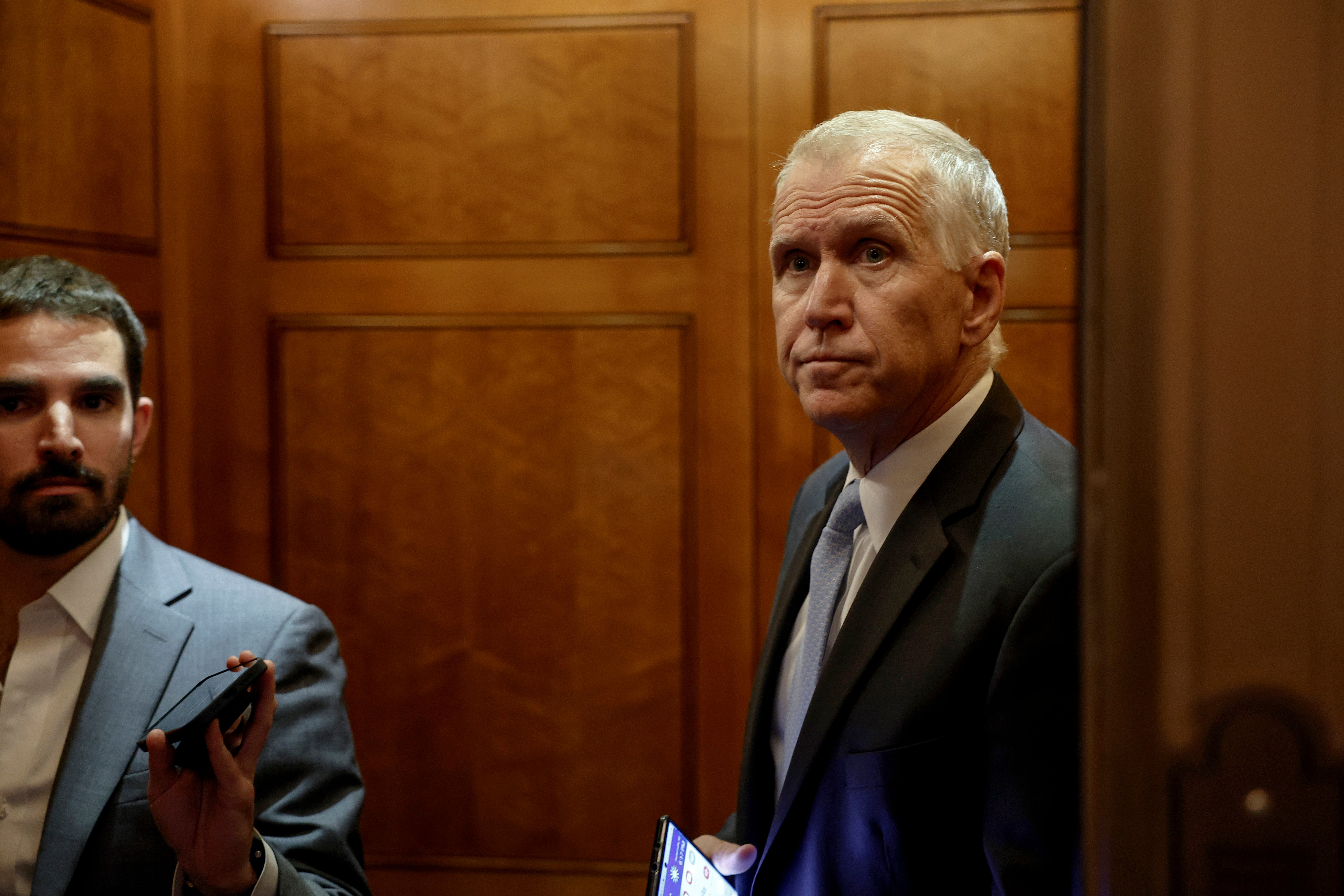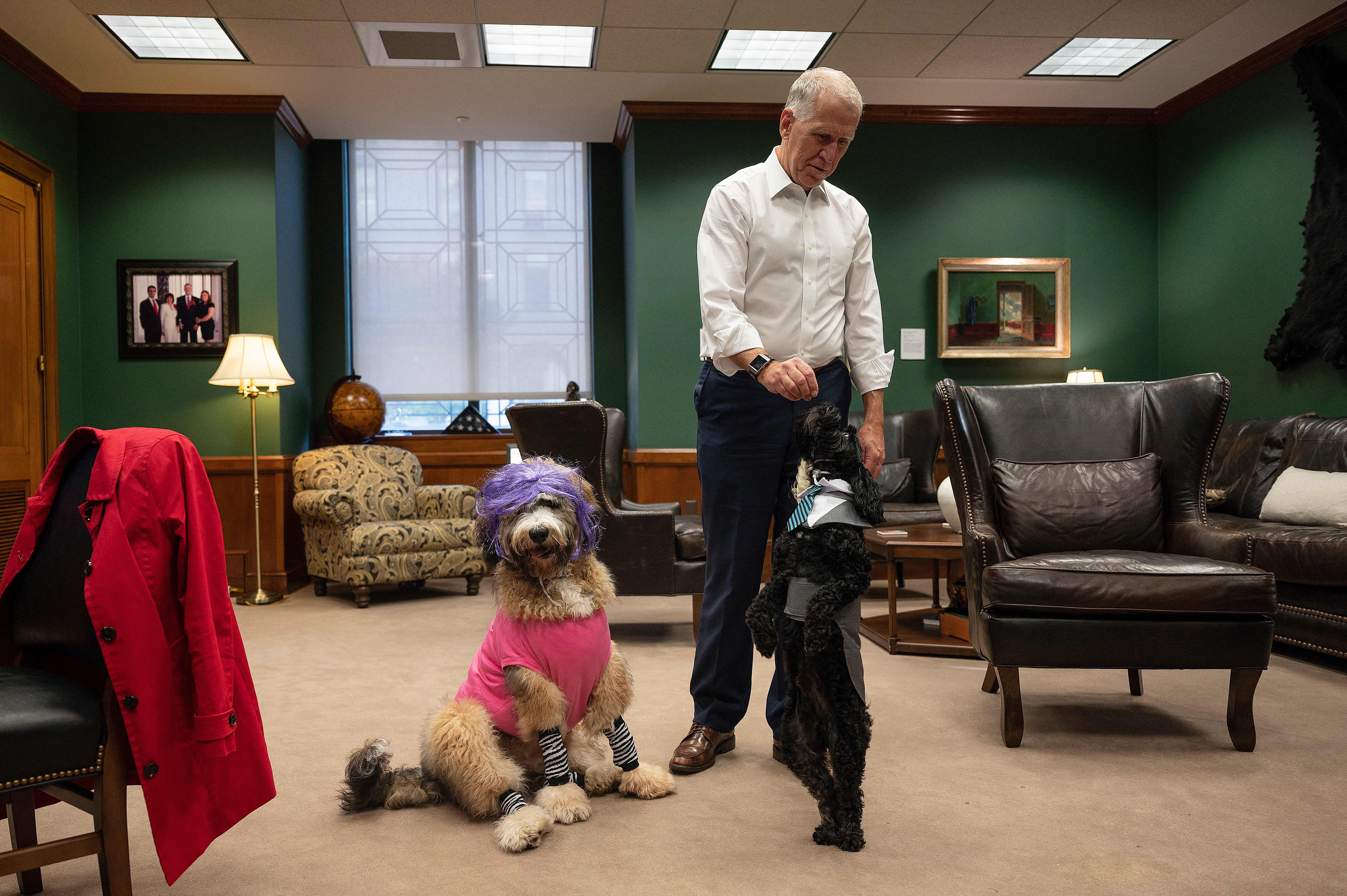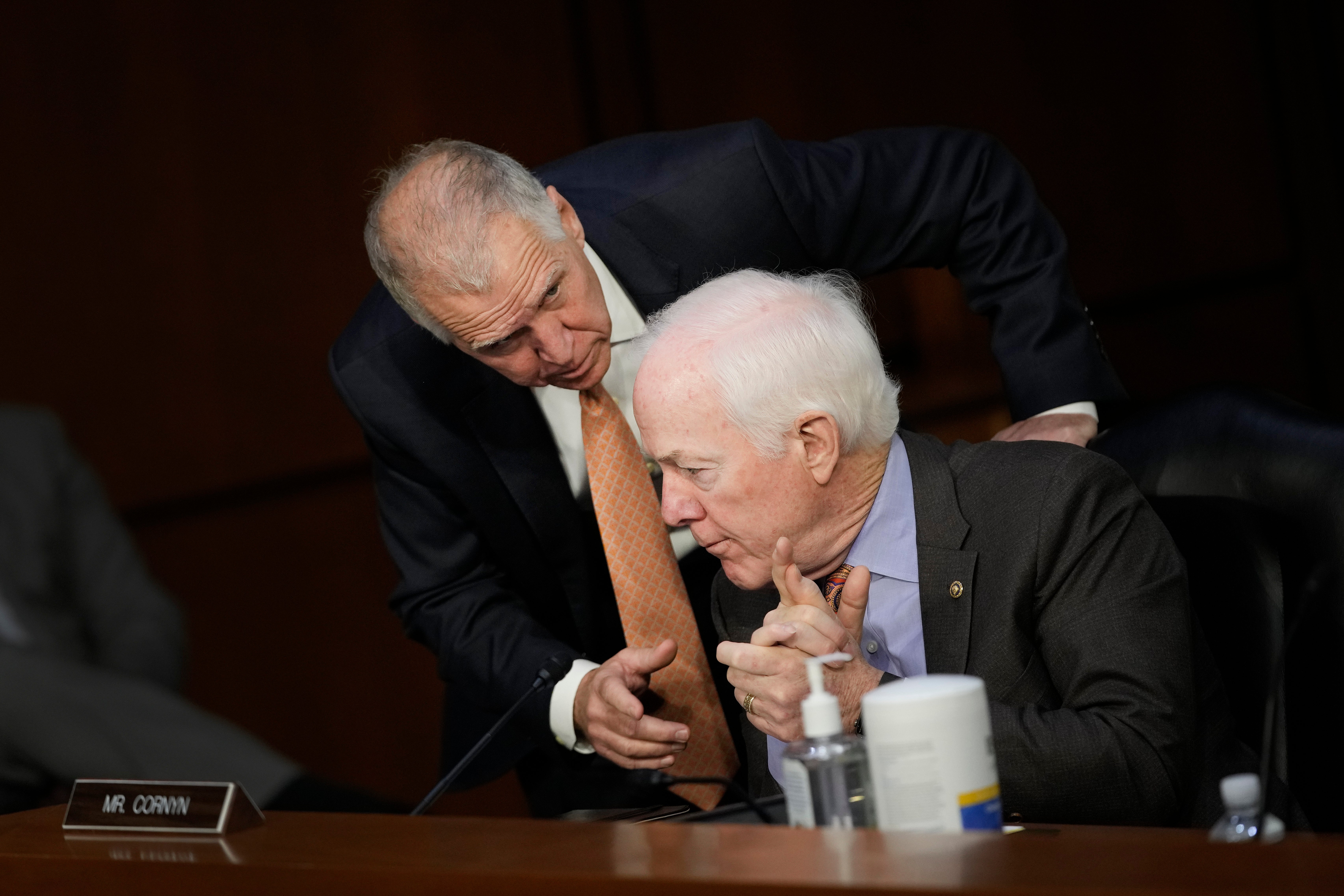GOP senator Thom Tillis is pushing back on Trump on guns. Why the North Carolina Republican think it’s time to act
The Republican senator who helped negotiate the first major piece of gun legislation in 28 years talks with Eric Garcia about bipartisanship, why Trump shouldn’t oppose the gun bill and why he supported a primary challenge against Madison Cawthorn


Your support helps us to tell the story
From reproductive rights to climate change to Big Tech, The Independent is on the ground when the story is developing. Whether it's investigating the financials of Elon Musk's pro-Trump PAC or producing our latest documentary, 'The A Word', which shines a light on the American women fighting for reproductive rights, we know how important it is to parse out the facts from the messaging.
At such a critical moment in US history, we need reporters on the ground. Your donation allows us to keep sending journalists to speak to both sides of the story.
The Independent is trusted by Americans across the entire political spectrum. And unlike many other quality news outlets, we choose not to lock Americans out of our reporting and analysis with paywalls. We believe quality journalism should be available to everyone, paid for by those who can afford it.
Your support makes all the difference.Amid the celebration after the US Senate passed the first piece of major gun legislation in nearly 30 years, following a string of horrific mass shootings in recent weeks, Democratic Senator Kyrsten Sinema of Arizona praised her Republican colleague Thom Tillis.
“Oh, Thom is wonderful”, Ms Sinema told The Independent, a rare comment to the press for the lawmaker. “So pragmatic, so focused on solutions. Also a great vote counter. Great whip.”
Their friendship is mutual. For Halloween last year, Mr Tillis dressed his dog Theo – named for Theodore Roosevelt – up as Ms Sinema, replete with a wig and a sweater that said “Dangerous Creature”, while he dressed his other dog Mitch up as Senate Minority Leader Mitch McConnell.
But Ms Sinema – who often prizes her relationships across the aisle, often to the frustration of her Democratic colleagues – was not the only Democrat to praise the two-term North Carolina Republican, who helped flipped both houses of his state’s legislature for the first time in a century and has twice narrowly escaped defeat from well-funded Democratic challengers.
“Just frankly, in a town that breeds cynicism and often a culture of contempt,” Senator Cory Booker of New Jersey said, “he has shown a lot of honor and a willingness to work.”
Mr Tillis has earned a reputation as an agreeable Republican despite the fact that he is one of the primary movers in conservative politics in his home state. The passage of the gun bill is the latest feather in his cap, thanks to negotiations between him, Ms Sinema, Republican Senator John Cornyn of Texas and Democratic Senator Chris Murphy of Connecticut. The quartet also worked with a larger group with 16 other Senators, which included Mr Booker.

The two-term Republican credited the successful negotations to several factors. He already knew Senator Cornyn, his colleague on the Senate Judiciary Committee, and Ms Sinema, whom he knows from the Banking Committee. Mr Tillis said he “admire(s) her independence” and “structured thinking” in negotiations. It was Mr Tillis’s first time negotiating with Mr Murphy, one of the most outspoken Democrats on gun control ever since the shooting at Sandy Hook Elementary School in his home state.
“But it was clear to me in the first meeting that he was serious, he was sincere and he wanted to get something done”, Mr Tillis told The Independent in an interview before the vote. “I was just joking with him on the elevator yesterday about that, because he overheard me saying to somebody, ‘We’ve got very, very different views,’ as I got on the elevator with him, and he said, ‘You’re right about that.’”
On the surface, Mr Tillis’s place in the negotiations might seem a bit peculiar. Mr Murphy has focused on guns his entire tenure in the Senate, Ms Sinema is the Republican whisperer in her caucus. And Mr Cornyn had a vested interest in passing legislation after the shooting in Uvalde in his home state. Nevertheless, he was suggested as someone to work with Mr Cornyn, which was around the same time Ms Sinema was asking for another Republican to work with them.

“So when I spoke with Sinema, I said that I’d be willing to get into the room, see if we could negotiate an outcome”, he said.
Mr Tillis’s propensity for dealmaking in Washington is, in some ways, a contrast to his time as the Republican strategist who helped steer a staunch conservative agenda in North Carolina. He was first elected to North Carolina’s General Assembly as a state representative in 2006, representing Mecklenburg County, where Charlotte is located.
After Barack Obama became the first Democrat to win the state since Jimmy Carter, Mr Tillis left his job at IBM to recruit Republican candidates for the state legislature and campaign for them, according to The Fayetteville Observer. That helped Republicans win both houses of the General Assembly for the first time in more than a century. As speaker of the House, he enacted a series of conservative policies like a sweeping tax cut and voter ID legislation.
In 2014, he beat Democratic Senator Kay Hagan by 45,608 votes in the midterm elections in what was the most expensive Senate race, when Mr Obama’s approval was at a low point.
Since arriving in Washington, he’s remained solidly conservative. He opposed Ketanji Brown Jackson’s nomination to the US Supreme Court, supported the repeal of Obamacare and the 2017 Republican tax cut bill signed by Donald Trump and opposed both of Mr Trump’s impeachments.
At the same time, he’s emerged as a conservative dealmaker – and not only on guns. He teamed up with Mr Booker – among other members of the Senate Judiciary Committee – to pass criminal justice reform after he threatened that he would not seek reelection if it didn’t pass. He also voted for the bipartisan infrastructure bill that President Joe Biden signed.
Mr Tillis said there were parallels between the gun negotiations and criminal justice reform, which Mr Trump signed in the form of the First Step Act.
“I think where negotiations between members and where it ‘breaks down’ on these thornier issues is when you have your staff represent you in the room,” he said. “So you have to kind of flip the script and have staff there to advise and welcome them to enter the debate, but you have to have members in the room.”
Mr Tillis also credited the possibility for a deal to the fact that they immediately discussed what was not open for negotiation, such as a mandatory waiting period, a ban on any type of weapons, as well as a federal red flag law. Rather, the legislation sets up a grant program for states to adopt their own red flag laws, which allow courts to determine if a person poses a threat to themselves or others and can have a firearm confiscated.
“Anytime you see negotiations around here bear fruit, you tend to be very open, very direct upfront so that you’re all of a sudden not negotiating something that completely changes the foundation of the agreement,” he said.
The shooting in Uvalde also happened amid another potential bipartisan deal Mr Tillis was crafting with Mr Cornyn on immigration reform. For that negotation, his partners are Senate Majority Whip Dick Durbin – who also leads the Senate Judiciary Committee – and Senator Alex Padilla of California. Mr Tillis said he thought there was a potential for a deal there too.
“Well, you know, I think if we use the same method or use the same process that there’s always opportunities for doing this,” he said. “At a level maybe a step below what we’re talking about today, it happens every day here for people who are willing to get in a room and work out compromises that people have been trying to work on for years.”
In turn, he ran for re-election in 2020. While initial polling showed him losing to former state legislator Cal Cunningham, Mr Tillis’s fortunes changed when text messages revealed Mr Cunningham had an extramarital affair. Eventually, Mr Tillis would win reelection in the Tar Heel State as Mr Trump won it a second time.
Mr Trump has sought to make his influence in Mr Tillis’s home state known; Mr Trump became the first Republican to win Robeson County in more than a century in both of his campaigns, and he endorsed Representative Ted Budd in the race to replace Mr Tillis’s Senate colleague Richard Burr, who also voted for the gun bill, over Mr McCrory.
Similarly, Mr Trump blasted the gun bill, which he called “the first step in the movement to TAKE YOUR GUNS AWAY” on Truth Social, while also calling Mr Cornyn a Republican in Name Only or “RINO”. But Mr Tillis pushed back on the accusation.
“I would say that for the vast majority of people who can walk in and purchase a gun and get a background check, it doesn’t change anything,” he said. “For states like North Carolina and others who have chosen not to implement red flag laws, it doesn’t affect them, but for the fact that we’re going to provide them with funding for crime and behavioral health interventions.”
At the same time, Mr Tillis said he hoped that Mr Trump didn’t oppose some of the other more conservative provisions.
“So I would hope that President Trump isn’t against, and I don’t believe that he is, school hardening and training,” Mr Tillis said. “I would hope that he wouldn’t be against the idea of an 18 year old that walks into a gun store who now has a record that’s one day old; it’s not enough to determine if that person’s a threat to themselves or to the society.”
It wouldn’t be the first time that Mr Tillis has crossed the former president. In 2019 he wrote an op-ed in The Washington Post criticising Mr Trump’s efforts to declare an emergency to build a wall on the US-Mexico border, though he later changed course and voted for it.
More recently, he and Mr Trump found themselves on opposite sides of the primary for North Carolina’s 13th District. Mr Trump sided with Representative Madison Cawthorn, who had angered many Republicans in the state after he tried to switch districts. Mr Cawthorn further angered Mr Tillis when he threatened to primary anyone who voted for the infrastructure bill and then touted its broadband expansion in the western part of the state.
“I felt very strongly that we need someone who’s a team player,” Mr Tillis said. “When I was speaker of the House, and since I’ve been up here, I’ve never asked for somebody to agree with me even 80 per cent of the time. We all have different views and different motivations. But I just felt like Mr Cawthorne was never willing to separate his own personal ambitions from the work ahead of us on any given day.”
In turn, Mr Tillis endorsed Chuck Edwards, a state senator after North Carolina’s Senate President Pro Tempore Phil Berger backed him, who pulled off a victory,
“I know I did not have the pleasure to serve with Chuck, he came in shortly after I left, but I knew him by reputation; now I know him well.”
Despite losing his primary, Mr Cawthorn still is serving the duration of his term. The day after the gun bill passed the Senate, it went to the House floor, Mr Cawthorn voted against it. It still passed and went to Mr Biden’s desk for the president’s signature.






Join our commenting forum
Join thought-provoking conversations, follow other Independent readers and see their replies
Comments